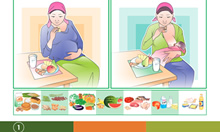
It took a while to persuade our colleagues and explain the benefits of a supportive supervision system. Now, we see the effectiveness of the system and how it helps us to be better. We meet and talk often and constantly provide feedback to each other to improve our counseling skills. We use SPRING-provided checklists for self- and peer-assessments.
-Mairam Usupova, head nurse with 37-years of experience in family medicine
Listening to Health Workers
The Kyrgyz Republic Ministry of Health (MOH) mandates that health facilities be periodically evaluated by personnel from higher level facilities. This process is sometimes perceived by health workers as intrusive and as perpetuating a power imbalance between health care providers and their supervisors. The results of these assessments are rarely accompanied by helpful improvement plans or guidance.
In 2015, the USAID-funded SPRING project began working with the MOH to improve infant and young child feeding (IYCF) and anemia counseling for patients in health facilities in Naryn and Jalal-Abad oblasts. To ensure the quality of these sessions, SPRING developed checklists and guidelines for line supervisors to assess health workers’ on-the-job performance following clinical trainings. These new tools were designed to provide ongoing support for skill retention and quality of services.
SPRING and the MOH introduced a supportive supervision system appropriate to the Kyrgyz context, launching a three-day training for over 96 health workers in Bishkek, Naryn, and Jalalabad.
SPRING has carried out 2,835 visits to 281 facilities to foster the institutionalization of supportive supervision and mentoring systems. After SPRING introduced this approach, provider performance assessment scores derived from the IYCF checklists increased by 42 percent.

Putting New Knowledge into Practice
Mairam Usupova is head nurse at a Family Group Practice (FGP), an outpatient primary care facility in Naryn oblast, that serves approximately 10,000 people. After receiving SPRING’s training, she implemented a supportive supervision system to improve the performance of health worker counseling in her facility. Mairam trained her providers on key practices, used the IYCF and anemia checklists to assess their skills, and organized feedback sessions with her co-workers. Initially, staff had concerns that these assessments would result in reprimands for poor performance, but the regular meetings and discussions helped establish trust and collaboration between Mairam and her supervisees.
Establishing Systems for Working Side-by-Side
SPRING works with providers and facilities of all sizes to establish systems for supportive supervision and peer mentorship for use after clinical trainings. The systems are driven by the team of health providers working together in a facility rather than by an outside authority. By incorporating performance monitoring and quality improvement as a routine part of health workers’ responsibilities, this approach has the potential to improve health and nutrition outcomes both immediately and in the long term. Mairam credits routine supportive supervision with improvements in performance, communication, collaboration, and documentation. Each month the small facility provides nutrition counseling to more than 200 mothers with children under the age of 2, and anemia consultations for 180 people on average (92 pregnant women, 70 children, 15 non-pregnant adult women, and 3 men).
Institutionalization of supportive supervision will result in sustained quality assurance of services across the Kyrgyz Republic. SPRING is continuing to work with the MOH to improve health service delivery through systems improvements like this one.

